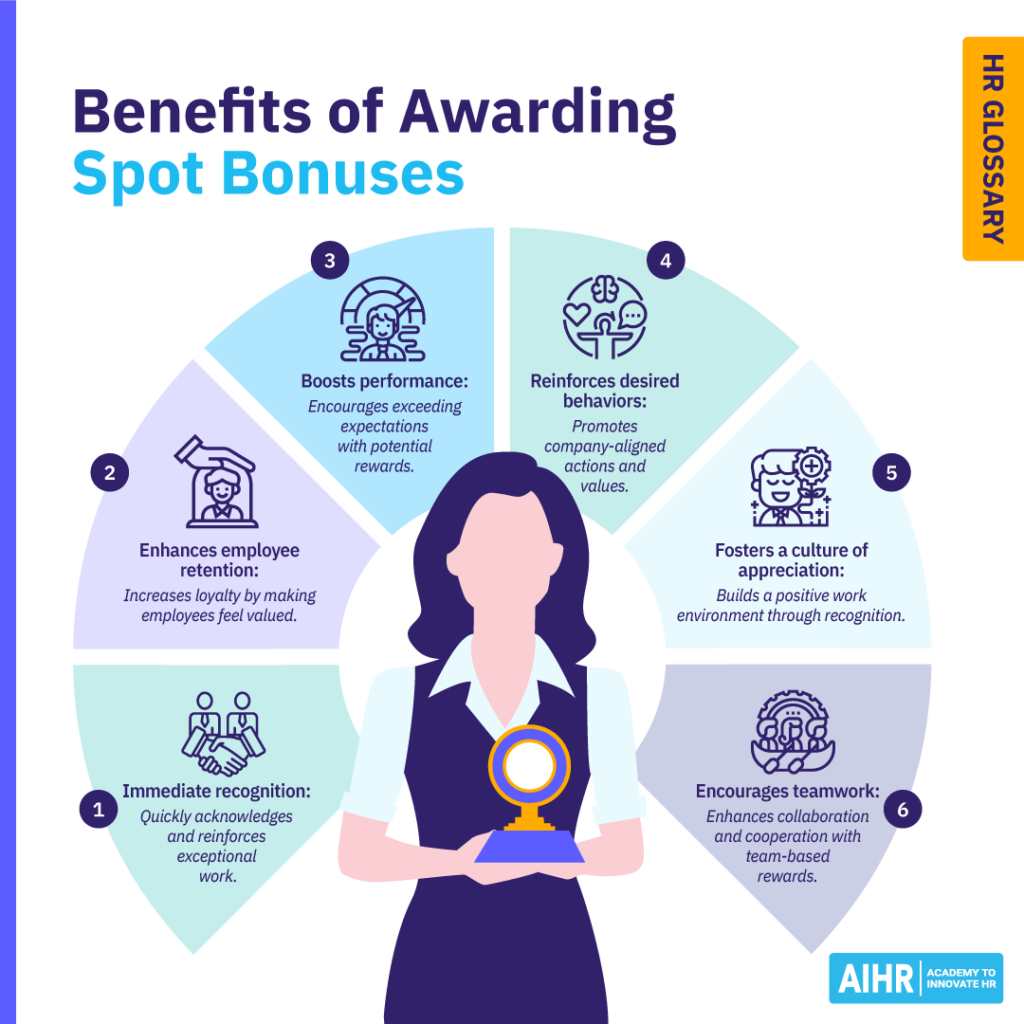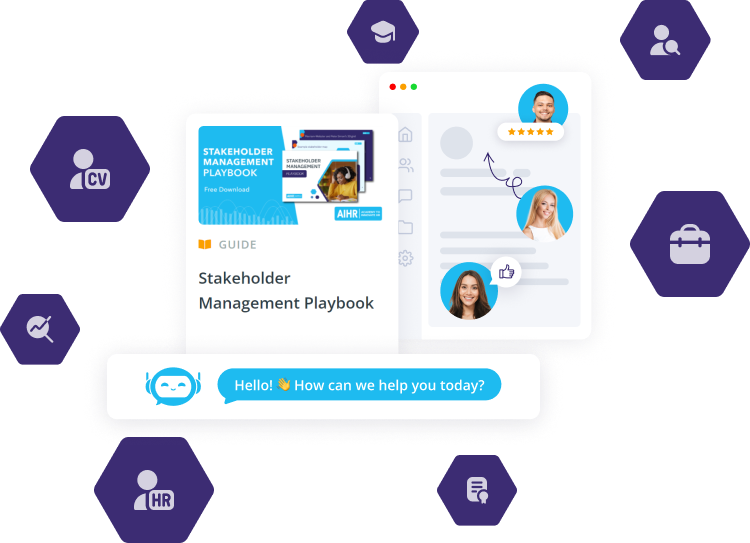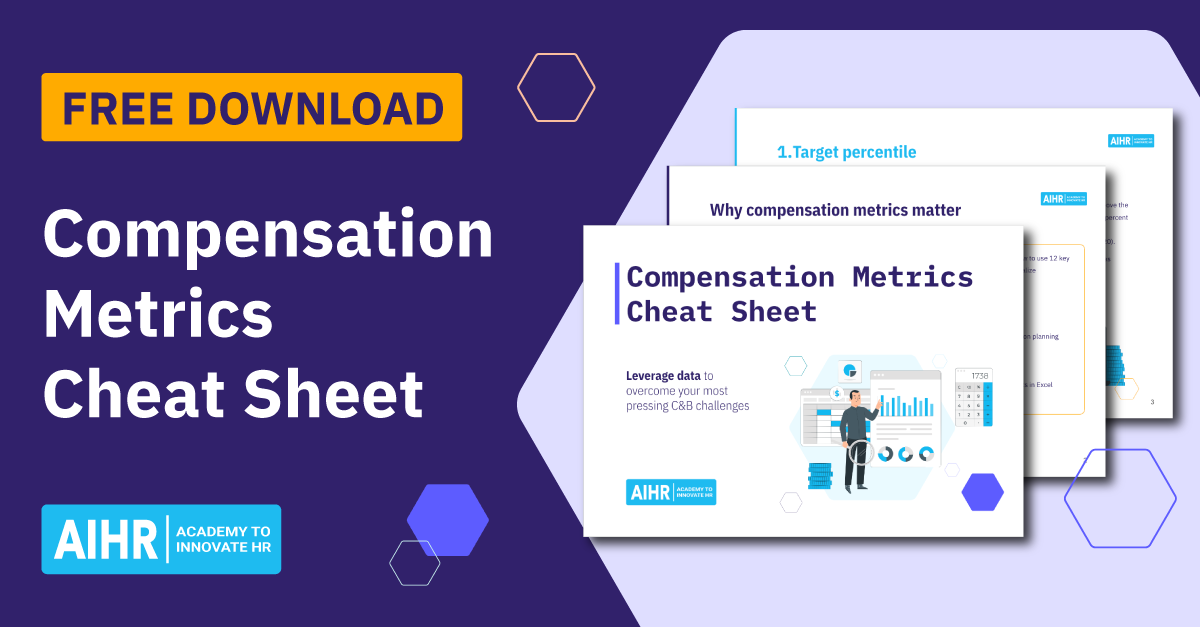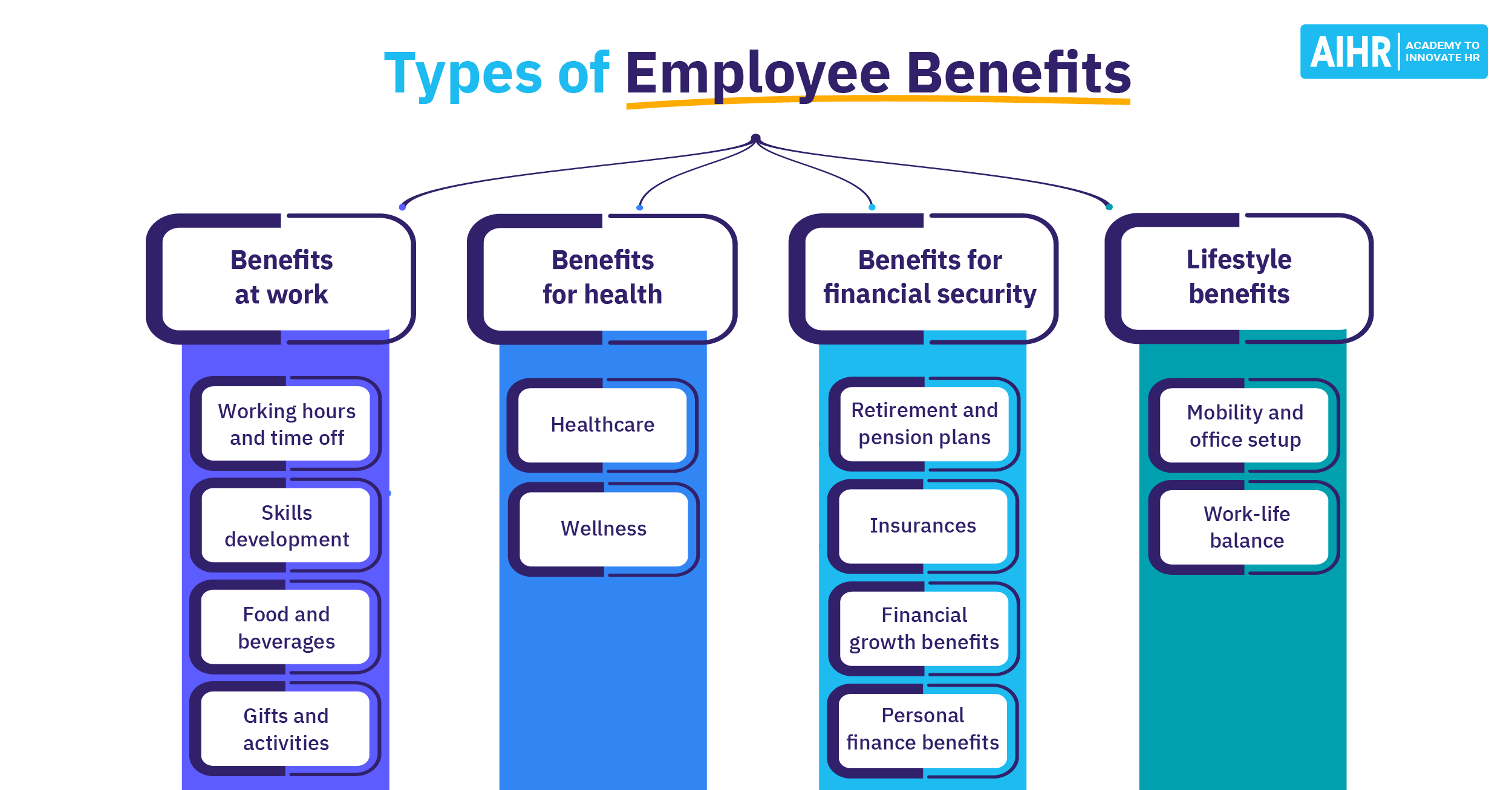Spot Bonus
What is a spot bonus?
A spot bonus is a one-time reward given to employees, typically to acknowledge high performance, a specific achievement, or reaching a particular milestone. Also known as a spot award bonus, it can be monetary (cash) or non-monetary (e.g., gift certificates, employee discounts, extra paid time off). Unlike performance bonuses awarded at specific times of the year, this type of bonus is immediate and can be given at any time.
Some organizations may have established spot bonus guidelines about the criteria around monetary value, senior management approval, or specific circumstances required for awarding these bonuses. HR should consider that certain tax implications may apply to spot bonuses, depending on the amount and type of reward.
Spot bonus examples
Spot bonuses are generally awarded immediately to recognize exceptional employee performance or contributions. Here are some common examples:
Monetary spot bonus examples
- $500 cash bonus: An employee receives a $500 cash bonus for outstanding performance.
- $100 Amazon gift card: An employee gets a $100 Amazon gift card for exceptional customer service.
- Paid weekend getaway: An employee gets a paid weekend getaway trip for their significant contribution to a major company event.
- Dinner for two: An employee who exceeds sales targets receives a voucher for a fancy dinner for two at a local restaurant.
Non-monetary spot bonus examples
- Extra day off: An employee gets an extra day off for completing a critical project ahead of schedule.
- Concert tickets: An employee receives tickets to a popular concert as a reward for innovative ideas that improve a process.
- New laptop: An employee gets a new laptop for going above and beyond their regular duties.
- Conference attendance: An employee is allowed to attend a prestigious industry conference, with all expenses paid, for demonstrating exceptional teamwork.
- Public recognition at a company meeting: An employee gets public recognition and a plaque during a company meeting for outstanding performance in a crisis.
- Personalized gift: An employee receives a personalized gift for exemplifying company values.
Case study: Google spot bonus
Google has a long track record of recognizing its employees for significant contributions in order to boost morale and drive team performance. Its spot bonus program is used to reward employees for exceptional one-time achievements. Managers can give these bonuses to employees who have worked on their teams or projects.
On a related note, Google also allows colleagues to recognize and reward each other through a peer bonus system. The company uses this system for outstanding contributions that managers may not have noticed.
Spot bonus vs. performance bonus
A spot bonus differs from a performance bonus in the following ways:
Timing
Spontaneous, immediate, or unplanned
Planned, awarded at specific times (e.g., annually/biannually/quarterly)
Reasons
Specific achievements, job performance, milestones
Individual job performance, reaching certain goals and/or targets
Amount
Generally smaller rewards, can vary based on achievement or event
Larger, based on pre-defined
Purpose
Immediate recognition, improve employee motivation and engagement
Reward exceptional performance, improve employee retention
Benefits of awarding spot bonuses
Rewarding employee contributions with spot bonus awards can be an invaluable tool to boost employee motivation and job satisfaction. Here are some other leading benefits:
- Provides immediate recognition: They provide instant acknowledgment of exceptional work, reinforcing positive behaviors and motivating employees to maintain high-performance levels.
- Improves employee retention: Rewarding employees based on their actions and contributions helps them feel valued, increasing their loyalty to the organization.
- Boosts performance: When employees know they may receive spot bonuses for their contributions, it can motivate them to go above and beyond their regular duties.
- Reinforces desired behaviors: By rewarding specific actions and attitudes, companies can promote behaviors that align with their business goals and values.
- Fosters a culture of appreciation: When employees feel their work is appreciated and rewarded accordingly with this type of bonus, it can help create a positive work environment.
- Encourages teamwork: When awarded for collaborative efforts, these bonuses can enhance employee teamwork and cooperation.

Developing a spot bonus program: Tips for HR
Offering a spot bonus program can give your organization a competitive advantage and greatly enhance its employer branding. To successfully develop such a program, follow these essential tips:
- Define spot bonus guidelines: Ensure your organization has a detailed policy outlining eligibility requirements, acceptable types of monetary and non-monetary awards, and the approval process.
- Include diverse reward options: Consider diversifying the rewards offered. Beyond cash bonuses, consider including other rewards like gift cards, extra days off, or special experiences and perks, such as dinner for two, weekend trips, or prime parking spots.
- Focus on inclusivity: Ensure the program is a balanced representative of all employees across the organization, no matter the role or level of seniority. Remind managers not to overlook remote employees.
- Raise awareness: Clearly communicate the program on all internal communication channels so that all employees know the details on eligibility, types of rewards, and the nomination process. Highlight employees and teams who receive these bonuses to motivate and engage other colleagues.
- Avoid overuse: Although some employees may consistently perform exceptionally well, avoid giving them spot bonuses too often. This can help prevent the appearance of favoritism and bias.
HR tip
Instead of focusing only on certain achievements, consider awarding spot bonuses for positive behaviors and strong examples of company culture. If, for instance, your organization prioritizes creating a learning culture, reward spot bonuses to employees who consistently build their skills through informal and formal learning. The company can also reward those who mentor and coach other employees, especially if their efforts result in tangible improvements and results.
Other types of bonuses
Here is a list of other types of bonuses that organizations can offer to their employees:
- Performance bonus: Given based on individual, team, or company performance against set goals or targets.
- Signing bonus: A one-time payment given to a new hire to incentivize them to join the company.
- Retention bonus: Provided to encourage employees to stay with the company for a certain period, often during critical business periods or transitions.
- Referral bonus: Given to employees who refer candidates who are then hired by the company.
- Discretionary bonus: Given at the employer’s discretion, often without a formal performance metric.
- Non-cash bonus: Rewards such as gift cards, travel vouchers, or other non-monetary items to recognize achievements or contributions.
- Relocation bonus: Provided to assist with the costs associated with moving for a job, often given to employees who need to relocate to accept a position.
FAQ
In the U.S., the tax rate for a spot bonus can be equivalent to the federal withholding rate of around 22%. For example, if an employee receives a cash reward of $500, an employer may withhold the federal tax rate from the total amount ($500 – 22% = $390). Employees may still be liable for paying any additional taxes on these rewards when they file their tax returns.
It’s difficult to determine the value of the average spot bonus, as it can vary widely depending on the size of the organization, reasons for the bonus, and the type of reward (monetary or non-monetary). That said, spot bonuses can range in value from $50 to $1,000 and, sometimes, even more.
The frequency of spot bonuses varies according to the organization. However, they are spontaneous and can occur at any time. The budget allocated for these bonuses is a key factor in determining how many can be given within a year.
A spot bonus is a one-time monetary or non-monetary award for a specific achievement that does not change an employee’s overall base salary. A raise is a permanent salary increase, often awarded for improved performance, together with a promotion, or on an annual basis.









